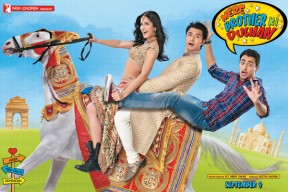Katrina Kaif as a rock star (She struts in slow motion towards the camera in crazy boots, with smoke curling out of her lips, strumming a guitar).
Katrina Kaif as another version (there have been many) of Geet in Jab We Met, ready to elope in the dead of the night with a phrase about “raita” that has been scattered by her careless energy.
Katrina Kaif drunk and ready to do a Sholay before gaonwalon and a buddhi mausi (naah, doesn’t work but we will get to that later).
Katrina Kaif in shorts, minis, salwars, a saree or two, jeans, burqa and the list goes on. Once in a while, a female actor becomes so successful that she is expected to do everything, be Seeta and Geeta, demure and saucy, sensuous and soulful, playful and serene. A Dimple Kapadia. A Madhuri Dixit. And forgive the blasphemy, even a Madhubala if you stretch your imagination a bit. And spike it with bhaang.
It would not at all be an exaggeration to say that Mere Brother Ki Dulhan is Katrina Kaif’s arrival in that space but here is the thing. The girl has arguably more charm and charisma than many of her contemporaries. And is a natural. If she wears false eyelashes, it does not show. When she turns her face towards the camera, it is easy to see why she has become a prototype for accented exotica that can switch to a girl-next-door warmth in a trice. There is a zone that she can negotiate without tripping. The zone of a real conversation as when she sits, bunched up and traumatised with Taj Mahal as her backdrop and speaks bitterly about how hard it is for a girl to be open and free-spirited in this country without being misunderstood. Or when she tells Imran Khan why she is ready to marry after living for 27 years as a self-willed girl.
She is good with the kittenish, bouncy, playful stuff. The dancing diva, explosively glamourous bits. But when she is expected to transcend her limitations, go beyond the endearing goofball act to jump on top of a jeep and do stand up comedy, it is with some trepidation and embarrassment that we watch her. It is then we realise that an actor needs more than just glitter to be iconic. She should know how to deliver dialogue. When to hold back. When to let go. And to know when she is crossing the line from being ebullient to screechy. Unbearably so. If this film was meant to show us just how the actor in Kaif has peaked..it just succeeds in showing us the frailties none of her films have revealed to us so far. There are times you just want to say, “Stop. Enough” as when she is bouncing on the backseat of a scooter or getting into a spat with a Sikh driver or hamming away elsewhere.
There is Imran whose face is one of the most static things in the film. He is easy to watch and easy to forget no matter what he does. Delhi Belly being the only film where the content pushed him to embrace a rather believable and darker aspect of his personality. Ali Zafar on the other hand seems to be genuinely having a good time and raises laughter with just a grimace, a quirky eyebrow, nicely timed delivery of stock dialogue and a decidedly camera-friendly presence. What a delight to see an actor from across the border fitting so well in an Indian narrative. Here is to more such excursions.
Despite an offensive title track that wants a brother ki dulhan to be responsible and fun along with many other impossible things,the film manages to steer clear of standard cliches about an ideal Indian bride and even allows the bride to be as willful as she wants to be without anyone judging her and there is some amount of freshness in the narrative till Imran’s Kush and Katrina’s Dimple Dixit fall in love and then suddenly from the point where a rather funny elopement scene unfolds, it all becomes a farce. Random songs pop up to string long stretches of banality together. Kaisa Yeh Isk Hai, being the only exception that stays in memory.
Lovely RD Burman tracks are placed awkwardly for some reason in wrong contexts and there is a burqa and a fake beard gag straight out of a 60s Shammi Kapoor film. The excessive situational levity could have done with some amount of brevity because the interminable twists make us lose interest in just exactly which brother is going to walk away with which dulhan. Yes, there are two. There is some stuff to smile at. Imran’s small town friends for instance. And the handsome Kanwaljit Singh who should have done many many films when he was young and hungry for good work. And Parikshit Sahni who still makes you nostalgic for the years gone by. There was a cosy Dehradun house too that I want to live in some day and wastefully expensive weddings in farmhouses and guesthouses and a surfeit of Salman Khan in absentia for some reason. Maybe because he is doing Yash Raj Production’s next. Some suggestive dialogues are also thrown in to spice things up.
But in the end, you just wish Ali Abbas Zafar, the debutant director had worked harder on substance than on the fillers. The film channels many classics but lacks the one thing that all romantic comedies are made of. A soul we can connect with. And a genuine sense of humour we can laugh with.
Reema Moudgil is the author of Perfect Eight (http://www.flipkart.com/b/books/perfect-eight-reema-moudgil-book-9380032870?affid=unboxedwri )








what a fantastic review! i just watched the film, 5 mins back and all i remember of it is how disgraceful katrina was and how charming ali is . and how very senseless the film was! a pole cudve been at imraan’s place n no one wudve noticed.
I cud not believe the extent of screen space she was given to ham it up!
haanh
This review works
write film reviews more often, Reema